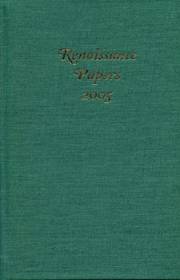Book contents
- Frontmatter
- Contents
- Renaissance Papers
- Bronzino, Castiglione, and A Self-Portrait: Re-evaluating Bronzino's Trip to Pesaro
- Tracing Astrophil's “Coltish Gyres”: Sidney and the Horses of Desire
- Shakespeare's Twins: Choric Juxtaposition
- Rhetoric and Intimacy in The Tempest
- “That Holy roome”: John Donne and the Conduct of Worship at St. Paul's Cathedral
- Conversation in Hutchinson's Order and Disorder and Milton's Paradise Lost
- Dryden on Epicoene's “Malicious Pleasure”: The Case of the Otters
Conversation in Hutchinson's Order and Disorder and Milton's Paradise Lost
Published online by Cambridge University Press: 12 September 2012
- Frontmatter
- Contents
- Renaissance Papers
- Bronzino, Castiglione, and A Self-Portrait: Re-evaluating Bronzino's Trip to Pesaro
- Tracing Astrophil's “Coltish Gyres”: Sidney and the Horses of Desire
- Shakespeare's Twins: Choric Juxtaposition
- Rhetoric and Intimacy in The Tempest
- “That Holy roome”: John Donne and the Conduct of Worship at St. Paul's Cathedral
- Conversation in Hutchinson's Order and Disorder and Milton's Paradise Lost
- Dryden on Epicoene's “Malicious Pleasure”: The Case of the Otters
Summary
MY argument is not that Paradise Lost is the production of a biblical literalist; we well know that, amidst many bits of scripture, there are a very great number of extra-scriptural lines. Yet if we compare Paradise Lost with Lucy Hutchinson's Genesis poem, Order and Disorder, we see in a new way the truth of the obvious. That can be best effected if we consider “conversation” in the two poems, and that in two senses—an ordinary understanding that conversers will listen to and respond to the words of others, and one contemporary with Milton and Hutchinson. OED defines an obsolete sense of “conversation” as “manner of conducting oneself in the world or in society; behavior, mode or course of life.” It was frequently so used in obituaries.
Order and Disorder shows a clear example of this sense of the word; in canto 6 we read that Enoch was
principally numbered amongst these
Whose conversation did th'Almighty please,
For he in faith did purely God adore. (6:565-67)
While he no doubt adored God verbally, that does not seem all the word points to. Thus, a bit later,
He conducted a chaste pious wife
And out of her a holy offspring raised,
Building a house which in that dark age blazed.
Like heaven's bright lamps that nightly wanderers guide
When muffling clouds day's vanquished glory hide,
So did his fair example brightly shine,
So was his conversation all divine.… (6:619-24)
- Type
- Chapter
- Information
- Renaissance Papers 2005 , pp. 85 - 102Publisher: Boydell & BrewerPrint publication year: 2006



